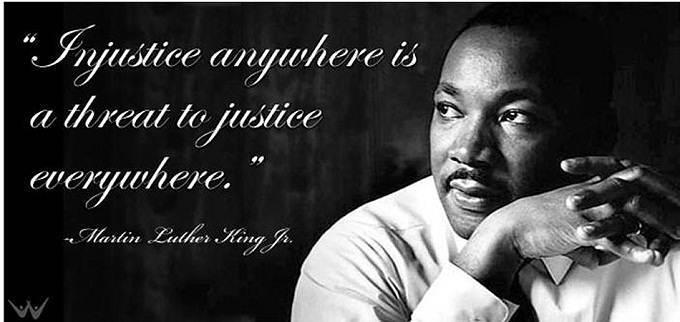Merry MLK Day!
Many readers will probably be reading this post from the context of a leisurely holiday from work or school due to the birthday of Martin Luther King, Jr. Perhaps some will have honored Dr. King by engaging in some sort of service activity during the day. Regardless, I hope everyone will take the time to reflect a bit on the life and works of the 1964 Nobel Peace Prize laureate. I had heard of Dr. King growing up and listened to some of his speeches, but I don’t think I had ever read any of his works until my undergraduate days. I recall being mesmerized by his eloquence to the extent that I took the extra time to critically review what he said/wrote and not just how he said/wrote it. If one carefully examines his work, it is not that difficult to decipher that Dr. King’s philosophical roots were both from humanism and existentialism. Of course, it should also be pointed out that many of Dr. King’s driving motivations and beliefs were derived from his spiritual beliefs; he was, after all, a Southern minister. Unfortunately, most of my notes and the actual texts I used at that time are packed away in storage, and I cannot remember the exact text I used. I think it was probably either I Have a Dream: Writings and Speeches That Changed the World or A Call to Conscience: The Landmark Speeches of Dr. Martin Luther King, Jr., but I am not completely positive. In addition to the various speeches and sermons, I also vividly recollect his Letter From Birmingham City Jail. Today, I share an excerpt from this work, but you can find the full text here. It is also available in both of the aforementioned anthologies and also Dr. King’s book Why We Can’t Wait.
“Moreover, I am cognizant of the interrelatedness of all communities and states. I cannot sit idly by in Atlanta and not be concerned about what happens in Birmingham. Injustice anywhere is a threat to justice everywhere. We are caught in an inescapable network of mutuality, tied in a single garment of destiny. Whatever affects one directly, affects all indirectly. Never again can we afford to live with the narrow, provincial “outside agitator” idea. Anyone who lives inside the United States can never be considered an outsider anywhere within its bounds.
You deplore the demonstrations taking place In Birmingham. But your statement, I am sorry to say, fails to express a similar concern for the conditions that brought about the demonstrations. I am sure that none of you would want to rest content with the superficial kind of social analysis that deals merely with effects and does not grapple with underlying causes. It is unfortunate that demonstrations are taking place in Birmingham, but it is even more unfortunate that the city’s white power structure left the Negro community with no alternative.
In any nonviolent campaign there are four basic steps: collection of the facts to determine whether injustices exist; negotiation; self-purification; and direct action. We have gone through an these steps in Birmingham. There can be no gainsaying the fact that racial injustice engulfs this community. Birmingham is probably the most thoroughly segregated city in the United States. Its ugly record of brutality is widely known. Negroes have experienced grossly unjust treatment in the courts. There have been more unsolved bombings of Negro homes and churches in Birmingham than in any other city in the nation. These are the hard, brutal facts of the case. On the basis of these conditions, Negro leaders sought to negotiate with the city fathers. But the latter consistently refused to engage in good-faith negotiation…
Over the past few years I have consistently preached that nonviolence demands that the means we use must be as pure as the ends we seek. I have tried to make clear that it is wrong to use immoral means to attain moral ends. But now I must affirm that it is just as wrong, or perhaps even more so, to use moral means to preserve immoral ends. Perhaps Mr. Connor and his policemen have been rather nonviolent in public, as was Chief Pritchett in Albany, Georgia but they have used the moral means of nonviolence to maintain the immoral end of racial injustice. As T. S. Eliot has said: ‘The last temptation is the greatest treason: To do the right deed for the wrong reason.’”
If you’d also like, you can also listen to Dr. King himself read this letter here:
